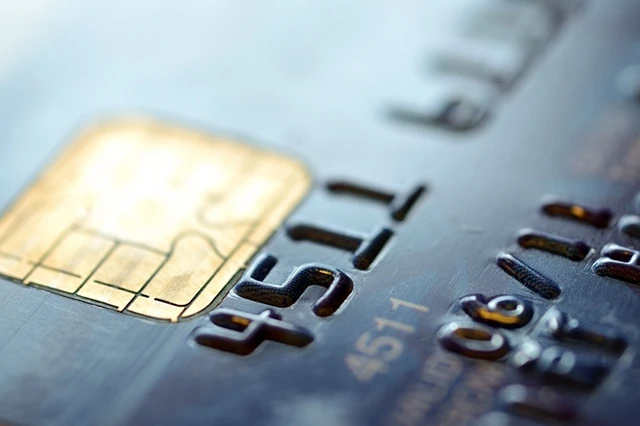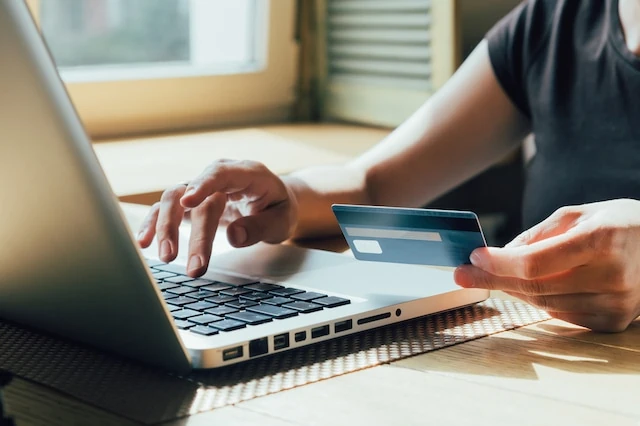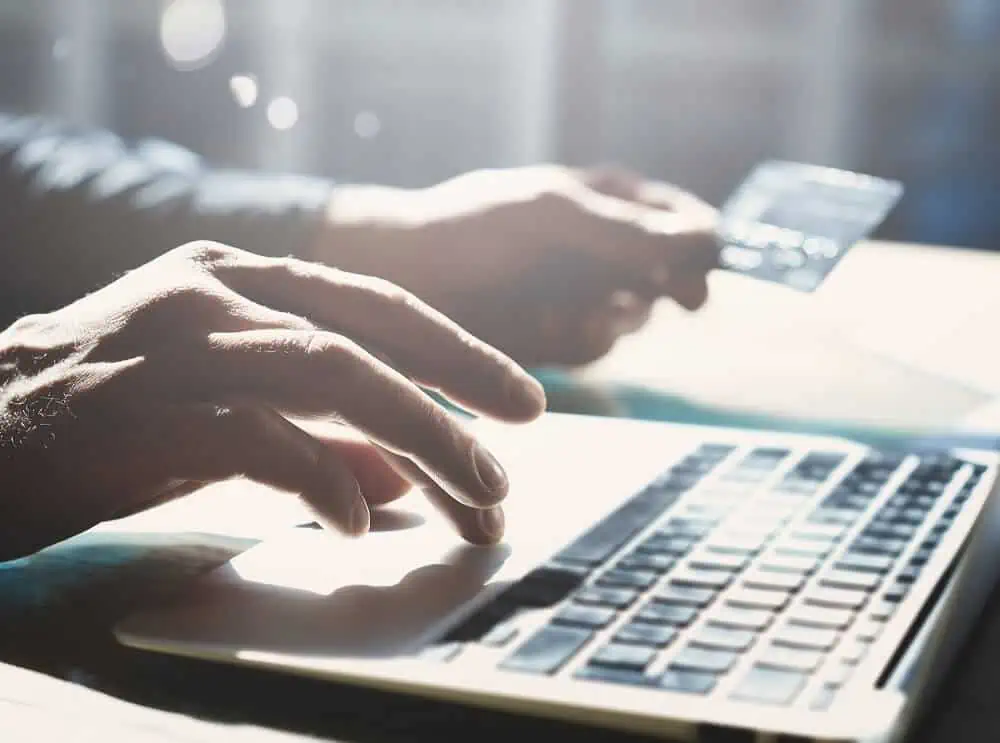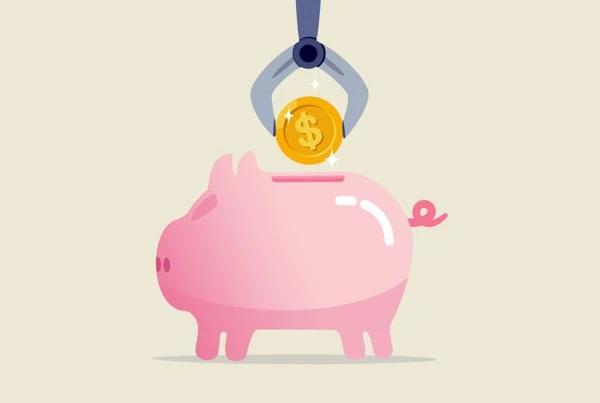There are many advantages to using debit and credit cards instead of cash. We’ve discussed in detail in other articles the importance of a credit card to establish a credit score, or how to build credit without a credit card, the benefits of getting a rewards credit card, and more.
However, one of the most substantial advantages of using cards instead of cash is the added security.
Let’s go over which is more secure in the credit card vs. debit card debate, what you need to know about card fraud, and other important safety considerations when making credit or debit card purchases.
Table of Contents
What is the Difference Between a Credit Card vs Debit Card?

While credit cards and debit cards look nearly identical and serve as convenient ways to make purchases both in-person and online, they function very differently. Credit cards involve using a credit line to buy items or services and then paying the credit card issuers back each month—and you might pay the full amount or pay the minimum with interest on the unpaid credit card balance.
Credit cards are more challenging to get but tend to come with more benefits. Credit card users build credit with their cards. If your credit card is a rewards card, you can also get bonuses, such as cashback or travel discounts.
When you spend with your debit card, you don’t borrow money. You use money directly from your checking account (debit cards usually don’t connect to a savings account, though you can transfer money from your savings account to your checking account for use on the debit card). You can’t spend money you don’t have unless your bank allows overdrafts (which may involve a fee).
One advantage of using a debit card over a credit card comes from not having to pay any interest on an unpaid balance—remember, debit cards don’t borrow money but instead spend money you already have. However, unlike credit cards, debit cards don’t build your credit through purchases and payments and rarely get cash back or other rewards. In addition to directly paying for items, you can use your debit card at an ATM to withdraw cash out of your bank account.
Aside from these functional differences, one of the most noteworthy distinctions between credit cards and debit cards comes with the amount of fraud protection each type of card carries.
We’ll go more into detail about card fraud in the sections below.
Related: Secured Credit Card vs. Unsecured: What’s the Difference?
What is Card Fraud?

Card fraud involves a criminal stealing a debit card, credit card, or all of either card’s details. Once somebody steals your card or card information, they often try to make large purchases quickly. The criminal may have spent a significant amount of your money before you notice a physical card missing or see charges you didn’t make on the credit card or bank statements. Fortunately, card issuers have gotten (and continue to get) better at detecting and preventing fraud.
Still, it remains essential you know which types of cards carry more consumer protections and the likelihood you’ll get your money back if you become a victim of fraud.
Related: 9 Best Credit Cards for No Credit History [Starter Credit Cards]
What Laws Protect You From Card Fraud?

For credit card fraud, consumers receive protection under the Fair Credit Billing Act (FCBA).
Let’s say you have your credit card bill on autopay but still regularly look over your billing statements (both practices are recommended). You notice several charges to a store you’ve never shopped. Some credit card issuers allow you to dispute errors electronically or over the phone. Others require you to send a notice for the errors on your statement physically. The credit card company has to receive the notification within 60 days of your statement date for you to be protected.
Once the company receives your dispute, it has 90 days to fix the error or say in writing why you or another person likely did make the charge on your card. The Fair Credit Billing Act limits a consumer’s liability to $50 if a user finds unauthorized charges on a card. While you wait for a response, you don’t have to pay for the fraudulent charges you reported, but you remain responsible for the rest of your bill.
For debit card fraud, consumers have protections under the Electronic Fund Transfer Act (EFTA). If you lose your debit card or know it was stolen, report it to your bank immediately. After you have reported it lost or stolen, you aren’t responsible for any charges if somebody later uses it.
If you don’t realize it was lost or stolen right away and somebody else uses it, the FCBA limits your liability depends on how quickly you report the fraud. In the event you notice within two days, your liability is limited to $50. However, if it’s between two and 60 days, you’re responsible for up to $500. Past 60 days, you’re liable for all losses.
Related: Best Credit Cards for Students with No Credit
What is Credit Card Fraud?

Credit card fraud occurs when someone uses your credit card without your permission. It could be a stranger who stole your card or someone you know who “borrowed” your card without your knowledge. The person may not have your physical card but instead have obtained the information online or through skimming your card.
You should only enter your credit card information on websites you trust. While you can usually get fraudulent credit card charges removed, it may temporarily harm your credit score and ability to get a new line of credit.
Related: Best Credit Cards for Teenagers
When is it Safer to Use a Credit Card?

In most situations, it’s safer to use credit cards than debit cards. Most credit cards have zero fraud liability policies and are overall safer in the event of fraud. It’s safer to use a credit card for online shopping because if someone steals your card information online, they won’t have access to the money held in your checking account. It’s also wise to use a credit card for large purchases, such as appliances. If your product is faulty or incorrect in some way, you can request a chargeback.
Many cards also have purchase protection and sometimes extended warranty protection.
A credit card also works better as an “emergency card” to give a responsible teenager or use when traveling. When credit cards are stolen, you still have your entire credit line available to you after you’ve reported it stolen. Some, but not all, credit cards also include travel insurance protection and cell phone protection.
Depending on how much money you keep in your checking account and how high your credit limit is, a credit card might allow you to spend more in an emergency.
Related: Best Credit Cards for Kids: Building Credit & Money Habits Early
Is the Credit Card Issuer On the Hook?

Providing you report fraud in a timely matter, you aren’t responsible for charges on credit cards. The credit card issuer or the merchant is on the hook for the costs depending on the fraudulent transactions. Unless, of course, the scammer is caught.
Card-present fraud means the fraudulent transactions occurred with a physical card, and an unauthorized person used a credit card in person. If the merchant took proper security steps, such as looking at the card and using a chip-enabled card terminal, the business isn’t responsible for the charges. Your card’s issuing bank is liable.
Card-not-present fraud occurs when fraudulent charges are made without the physical card. The transactions can happen online, over the phone, or through the mail. When there isn’t a physical card, and the merchant can’t verify the buyer is the true cardholder, the merchant is on the hook for any chargebacks.
Most credit card issuers penalize merchants who process a significant amount of fraudulent orders by requiring them to pay higher fees.
What is Debit Card Fraud?
Debit card fraud occurs when an unauthorized person uses your debit card or PIN to withdraw money from your bank account or make purchases.
A thief might steal your physical card and use it to shop in person or online. As the person would need your PIN for this, it’s likely a person you know who could guess that number. Alternatively, it could have been somebody behind you in an ATM or store line which saw the PIN you typed.
Someone might use a card skimming device at a fuel pump that skims your debit card information and then use it to buy items online. Anyone who sees your bank statements could copy down the numbers, or an unsecured website might steal your information.
Money withdrawals and purchases with your debit card are immediately taken out of your checking account.
When is it Safer to Use a Debit Card?

As discussed earlier, it’s safer to use your debit card than to use cash because of the protections you receive from the Electronic Funds Transfer Act (EFTA). The EMV chips now found on debit cards make them much more difficult to skim than in the past, and your debit card is only helpful if someone knows your PIN.
With cash, you have no protections. However, it’s safer to use a credit card for fraud protection than to use a debit card. With credit cards, you can do chargebacks and never actually lose any money. Although it’s safer to use credit cards, there are still reasons to use a debit card.
You can sometimes avoid fees by using a debit card instead of a credit card at small businesses. It’s also a way to prevent yourself from overspending and going into debt.
Related: Axos First Checking Account Review [Free Checking + Debit Card]
Is the Issuing Debit Card Financial Institution on the Hook?

Depending on the situation, different parties are liable for fraudulent charges on debit cards. As long as lost or stolen debit cards are reported within two days, the consumer can only be on the hook for a maximum of $50. However, as previously mentioned, if you don’t report quickly enough, you have more liability.
If you’re using your debit card at a store that doesn’t have an updated card terminal that reads cards with chips, the merchant is liable if your information is stolen. As long as the store is using up-to-date technology, the debit card issuer is on the hook. If an unauthorized person makes online purchases with debit cards, the card issuer is again responsible.
Related: 10 Best Debit Cards for Teens
Can Someone Access Your Bank Account through Debit Card Fraud?
When debit cards are lost or stolen, it doesn’t necessarily mean the bank account needs to be canceled as well. The bank can send you a new card and you can change your PIN. Without more information, they can’t access your bank account.
However, suppose someone knows your debit card number and other personal information, such as your birthday or Social Security Number. In that situation, this person can commit several types of fraud online. Be wary of anyone who asks you to share banking information online or over the phone.
With enough information, a person could access your checking account and change your password. Make sure to check your debit card transactions regularly.
Related: 11 Best Banking Apps for Kids & Teens [Teen Banking & Debit Cards]
Is it More Secure to Use a Credit Card or Debit Card for Online Purchases?

For online purchases, it’s more secure to use credit cards than it is to use debit cards. If you order something online and it never arrives or is damaged upon arrival, you can withhold credit card payment. This is called purchase protection or purchase assurance.
With some credit card companies, the protection continues past delivery. Sometimes, you can get extended warranty protection, so you can file a claim if you break an item within a designated amount of time. You might also have some protection against porch thieves stealing your deliveries and be able to quickly return items (even if a store has a no-return policy).
If you paid with a debit card, your money was already taken, and you would have to wait for it to be returned. You have less protection against items that are not delivered, damaged, or stolen. If card information is stolen, fraudulent charges are frozen for credit card users, and the credit line isn’t affected. There was no money taken from you that needs to be given back. In contrast, with a debit card, money is deducted from your checking account.
While the dispute occurs, you could be missing a significant amount of money and not have it back in time to pay necessary expenses.
Related:
- What is an Unsecured Credit Card and How Does It Work?
- What is a Secured Credit Card and How Do It Work?
How Can You Protect Yourself From Card Fraud?
While some factors are out of your control, there are several ways you can reduce your chances of card fraud. These include:
- Always be skeptical when someone asks you to share information about your debit or credit cards online, over the phone, or in a text message.
- When shopping online, make sure the websites are secure.
- Check that nobody is watching you enter your PIN when using your debit card.
- Look at bank statements and credit card statements regularly.
- Keep track of your credit score. A dip might be from increased utilization from unauthorized spending.
- Don’t use gas pumps or ATMs when the card reader looks loose. It may have a skimmer attached.
- Know where your cards are at all times.
- Set up text message alerts that notify you are large purchases.
- Choose credit cards that have $0 liability for unauthorized charges.
By following the tips above and choosing the safest debit and credit cards, you can significantly reduce your chances of card fraud.
Related:





![Check Out the New 401(k) Contribution Limits for 2026 [Save More for Retirement] 24 number blocks switching from 2025 to 2026.](https://youngandtheinvested.com/wp-content/uploads/2025-to-2026-blue-background-1200-600x403.webp)

![7 Best Microsavings Apps [Save Money, Reach Your Goals] 26 best microsavings apps](https://youngandtheinvested.com/wp-content/uploads/best-microsavings-apps-600x403.webp)
